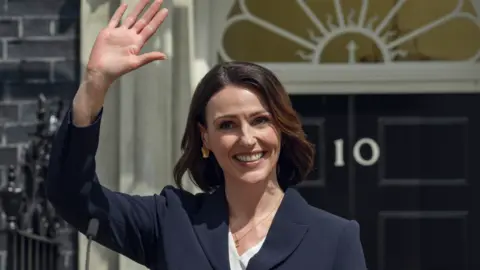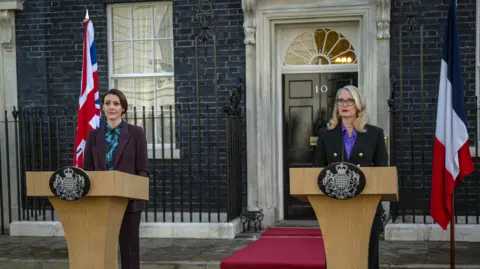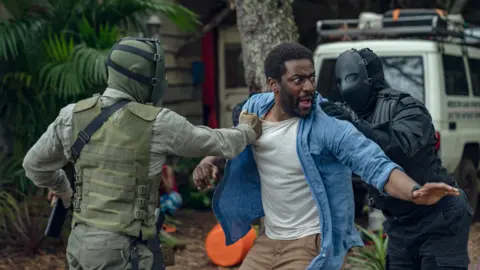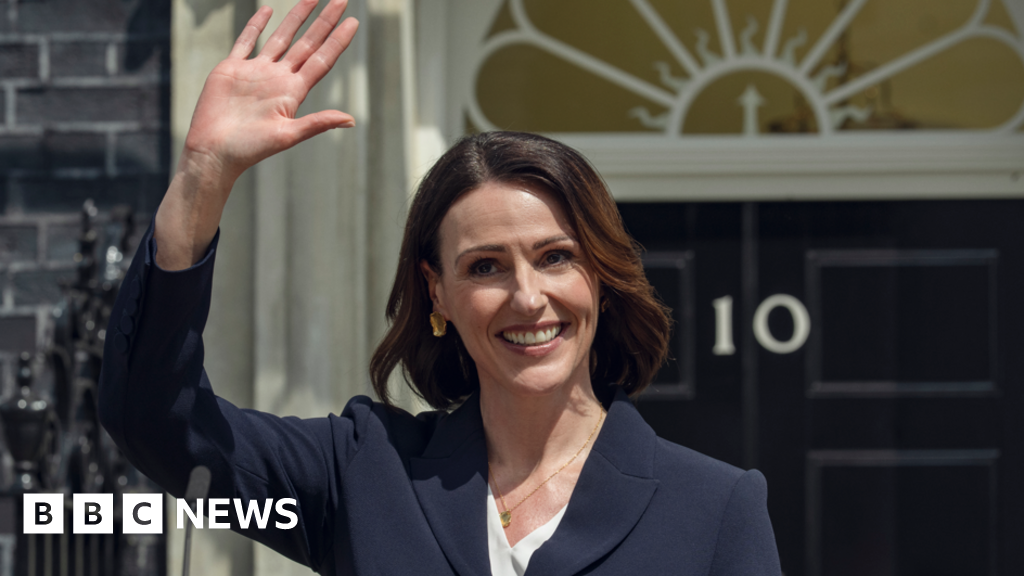 Netflix
NetflixActress Suranne Jones has taken on the role of many women under immense pressure. In Doctor Foster she suspects her husband of having an affair, in Vigil she investigates a death on board a submarine, and in Gentleman Jack she develops a dangerous lesbian romance.
But none of the roles are quite as pressured as her latest – playing a British prime minister whose husband is kidnapped.
Hostage, Netflix’s new political thriller, sees Jones’ character, Abigail Dalton, build an uneasy alliance with French President Vivienne Toussaint – played by Julie Delpy – who is being blackmailed during a London summit.
The two leaders work together in order to rescue the PM’s husband, unmask the kidnapper and blackmailer, and bring those responsible to justice.
‘Political with a small p’
Given its themes of immigration, the funding of the NHS and public trust, audiences may be tempted to connect Hostage to today’s headlines.
But, both stars insist the show is less about mirroring today’s politics and more about creating a thrilling story set in the political world.
“We’re entertaining and we’re in the political world, but it’s in no way a reflection of the world we live in,” Jones tells the BBC.
“It’s political with a small p – there’s enough that roots us in the real world but the world is too complicated to link it directly and I think it would be inappropriate.”
Delpy agrees and says: “Things change every day. It’s impossible to be in the political moment because tomorrow is something else.”
The show’s writer, Matt Charman, explains that there are some connections to the real world as it’s “impossible to write a show that exists in the climate we live in that doesn’t end up feeling that it’s in dialogue with it”.
“If you wrote a show that isn’t connected to our world it would feel weird,” he says, “but I hope the show does have the ability to exist in its own oxygen.”
 Netflix
NetflixIt is rare to see two female world leaders sharing the spotlight in a political thriller, but, for Charman, making sure Dalton and Toussaint were women was integral to the way the series was conceived and it was both a creative and political choice.
“What was exciting was the idea of women in power and how we explore that,” he says, explaining that he tried to explore how each situation the characters face would be different for a woman.
“There’s a double standard for women, so giving full dramatic freedom to that was very important.”
Charman and Jones have shared an agent for the past 10 years and Hostage came about because Charman really wanted to work with Jones and the pair settled on creating a political thriller.
Jones says she particularly enjoyed exploring “how these two women have to dance around each other”.
“A female politician is used to dealing with men so it’s interesting to see how it plays out when it’s two women.”
While viewers quickly learn about Jones’ character – a loving wife and mother who is idealistic about bettering the country – Delpy’s character is more drawn out and our opinion of her changes throughout the show.
“We made sure not to play into the female politician stereotypes,” Delpy say. “What I like is that these women actually have some things in common like they both want change and came into office hopeful.”
The Guardian describe Hostage as “quite unusual” in that it doesn’t remind you of any other political thrillers.
“It’s a little biting but it’s not House of Cards cynical, it has a breakneck pace but it’s not 24, the dialogue is sharp but never played for laughs,” Zoe Williams writes.
‘Cost of being in power’
To play Dalton convincingly, Jones, who also served as an executive producer on the show, says she really immersed herself in the reality of political life. She visited the House of Commons, spoke to the Speaker of the House and devoured books, podcasts and documentaries.
“I’m a bit of a geek when it comes to research,” she admits. “I was fascinated by not emulating anyone but by understanding a life I knew nothing about. And it’s the cost of being in a powerful position in that way that really struck me.”
Charman also talks about the extraordinary amount of research that went into creating the show.
I ask him whether Dalton or Toussaint were inspired by any real life politicians and he confesses that they are, but he won’t say who.
“We interviewed a lot of people and Suranne had incredible access to people who had been prime minister who talked about their time in office and the pressure on their family. But it was all agreed that they would speak about this as long as it could remain confidential,” he says.
Jones won’t say which politicians inspired her character but says all of her previous characters are a part of her and she has “a boardroom of personalities” which feed into who she plays.
She says all the research into what it’s like to be a politician “changes your perception for sure” and makes you realise “the cost of being in a powerful position”.
 Netflix
NetflixOne question the show raises is whether or not it’s possible for a politician today to stick to their ideals once they come into office and while Jones is unsure, Charman is an optimist.
“I wanted to explore how there can be decent people in politics who are fundamentally good but get pushed around,” he says.
He adds that it’s not “inevitable” that people give up their ideals once in office, but “it’s definitely tough to keep your morals”.
Above the thrills and drama of Hostage, Charman says the show explores “what it takes to be a good person in a system that doesn’t always reward good people.”
Delpy is slightly more pessimistic and explains that given “politicians have to be heard, if you’re too reasonable you won’t be listened to as there’s so much noise of both extremes”.
“If you have a moderate view you get lost in the noise as people are only listening to the loudest.”

